
When a tenant signs a lease, they agree to live in the rental property for a set period of time. While most tenants have every intention to see the term of the lease through, situations may come up that may force them to leave early.
Leaving before the term of the lease ends is what's called breaking a lease. Some situations may be legally justified, whereas others may not.
Here’s everything you need to know about breaking a lease in the state of Florida.
Legally Unjustified Reasons for Breaking a Lease in Florida

The following reasons don’t offer enough justification to free a tenant from a lease early:
• Buying a new house.
• Getting a new job.
• Moving in with a partner.
• Moving to get closer to friends and family.
As legitimate and as compelling as such reasons may seem, these aren’t legally justified reasons to break a lease. As such, a tenant wouldn’t have any legal protection against penalties.
Legally Justified Reasons for Breaking a Lease in Florida
A tenant may be legally able to break their lease in Florida in a handful of scenarios. They are as follows.
1. There's an early lease termination clause.
A lease termination clause is exactly what it sounds like: it essentially lists the conditions a tenant needs to meet if they want to end their lease early. Usually, it details the penalty fee as well as the notice period a tenant must give.
If a tenant meets these requirements, they would be free from any further obligations under the lease. Essentially, they wouldn't be responsible for further rent obligations.
2. The tenant is starting active service.
Active service members are protected by the Servicemembers Civil Relief Act.
The protection begins from the date they enter active duty and ends thirty to ninety days after discharge. The act requires an active service member who is relocated to meet the following rules:
• Show proof that they signed the lease before starting active duty.
• Show proof that they intend to remain on active duty for at least the next ninety days.
• Provide you written notice of their intention to leave, as well as accompany it with the deployment information.
Even with all that done, the lease doesn’t end immediately. After giving notice, the earliest they can move out is 30 days after the next rent period begins.
In Florida, “servicemembers” are members of the armed forces, activated National Guard, Commissioned Corps of the Public Health Service, and the commissioned corps of the National Oceanic and Atmospheric Administration.

3. The unit isn’t habitable.
The state of Florida requires landlords to meet certain minimum standards in regards to health and safety in rental units. If you don’t meet those standards, a tenant may be able to move out early without penalty.
Under the Florida landlord-tenant law, the following are some examples of situations that make a unit uninhabitable:
- A disfunctional electrical meter.
- Faulty electrical wiring.
- Not being structural sound or safe.
- Not having both hot and cold running water.
- Leaking ceiling.
- Having no heating system.
- Absence of locks on exterior doors.
- Broken windows, gates or doors.
A tenant may be able to cite any of these reasons as a legal justification to move out. Fla. Stat. Ann. § 83.60 states the conditions a landlord must meet when it comes to providing habitable premises.
4. You get accused of landlord harassment.
If an action is serious enough, harassment by a landlord can be sufficient ground for a tenant to move out.
Simply put, landlord harassment is the creation of conditions by a landlord that make a tenant uncomfortable.
Some examples include:
• Withholding amenities they are entitled to under the lease agreement.
• Intentionally neglecting repairs, especially if out of retaliation.
• Illegally trying to evict your tenant. For example, trying to remove their belongings or locking them out of the unit. This is known as a 'constructive eviction'.
• Imposing an illegal rent increase.
• Creating excessive noise.
5. Violating the privacy rights of your Florida tenant.
This is another form of landlord harassment. While landlords have a right to enter their tenants’ units, they must do so in accordance with the law. First and foremost, Florida landlords are required to provide at least 12 hours' notice to their tenants prior to entry.
Secondly, the time of entry must be reasonable (typically between 8AM and 5PM, or as agreed upon by both parties). And, thirdly, the reason for the entry must be reasonable.
Common reasons for entering a tenant's property include:
• When granted access by a court order.
• To carry out a regular inspection.
• In emergency situations.
• When you want to show the unit to prospective buyers or lenders.

6. Violating the terms of the lease agreement.
After signing a lease, both parties agree to abide by its terms. The following are some responsibilities you have as a Florida landlord:
• Provide a unit that meets all applicable health and safety codes.
• Treat all tenants with respect, without any form of discrimination.
• Respond to repair and maintenance issues on time.
• Maintain structural components and a weather-protected unit.
• Provide functioning plumbing and electricity.
If you aren’t able to abide by these responsibilities, a court may rule that you have “constructively evicted” your tenant. Consequently, your tenant may end the lease early.
Disclaimer: This blog is only meant to be informational and not a substitute for professional legal advice. If you need professional help, kindly get in touch with a qualified attorney or an experienced property management company.
